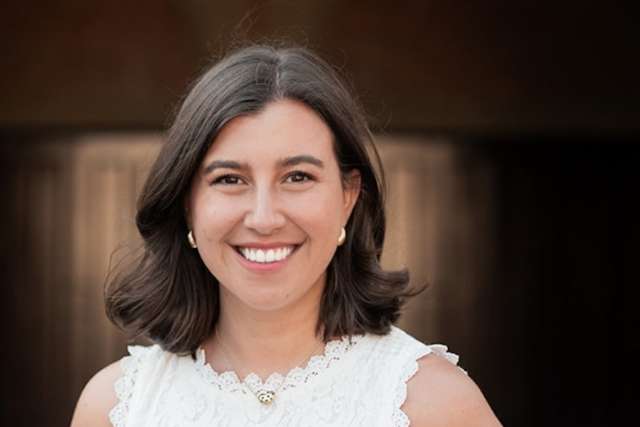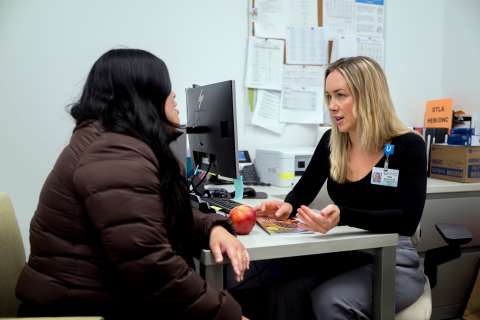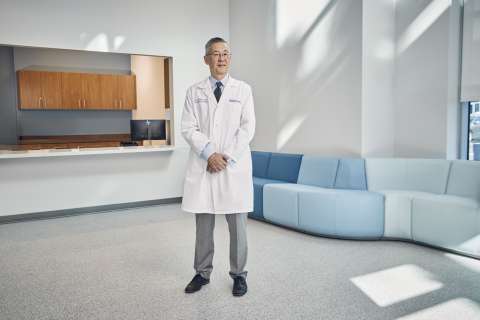For Giselle Nissenbaum, resilience has always meant finding strength in times of adversity.
At just 10 years old, Nissenbaum lost her hearing and within months, underwent life-changing surgery at UCLA Health to receive cochlear implants.
“When I was a toddler, my mom noticed that whenever she spoke to me, I would look at her mouth instead of her eyes,” she says. “It became clear early on that I was already relying on lipreading, though the cause of my hearing difficulties wasn’t yet understood.”
While Nisenbaum’s journey brought early challenges, she never could have imagined how pivotal it would become to her career a decade later.
“Losing my hearing and receiving cochlear implants at a young age forced me to attune to people very differently,” says Nissenbaum. “I have to give someone my full attention when listening. I have to read their lips. I have to pick up on facial expressions and body language and all the subtleties that communicate meaning.”
Today, as a gynecologic oncology clinician at the Simms/Mann UCLA Center for Integrative Oncology, Nissenbaum draws on those very skills to provide compassionate care and emotional support to her patients.
“What began as a necessity to communicate has become one of my greatest strengths as a clinician and a listener,” she says. “The hidden blessing of losing my hearing revealed that the very practices I rely on to hear are what make people feel so deeply heard and seen.
“And so, I have come to understand that listening is really the deepest form of care that we can give to others.”
Providing care and compassion
In September 2024, Nissenbaum joined the Simms/Mann Center as an intern during her second year of graduate school at USC.
“From the very start of my internship interview, I was deeply drawn to the work of the Center and its patients,” Nissenbaum says. “All I could think was what an honor and privilege it was … to be entrusted with this role and to witness patients’ stories and experiences.”
Since joining the team full-time in June 2025, Nissenbaum has continued to offer practical and emotional support to women navigating ovarian, uterine, endometrial, vulvar and vaginal cancers.
According to a 2024 study published in the International Journal of Gynecology & Obstetrics, there were nearly 1.5 million new cases of gynecologic cancers worldwide in 2022, representing 16.1% of all new female cancer cases.
At the Simms/Mann Center, Nissenbaum plays a vital role by serving as a liaison with each patient’s multidisciplinary care team, coordinating transportation between appointments, connecting patients with nutritionists and helping their families access other important resources.
On an emotional level, Nissenbaum also guides patients through every step of the cancer journey.
“To be present in the clinic means that I can meet patients in real time and meet them exactly where they are, providing support that is both immediate and fully integrated in their medical care,” she says.
She calls this the most meaningful part of her work, inviting her patients to reflect on two fundamental questions: “Who do I want to be if I survive this cancer diagnosis? And who am I right now if I don't?”
And although gynecologic cancer brings unique challenges, Nissenbaum says it often encourages patients to reevaluate their identity and reflect with gratitude.
“In gynecological oncology, the emotional impact of it is often tied to questions of grief, loss, shame, identity and selfhood,” explains Nissenbaum. “Supporting women through these very specific cancers means not only acknowledging the medical challenges but also acknowledging the deeply personal and social dimensions of this experience — women deserve that so much, and that part of their treatment really deserves to be understood.
“The intersection of women's health and oncology is really important work, and these experiences are so layered emotionally, socially and culturally — extending far beyond the medical facts of the diagnosis,” she says.
Bringing a global health perspective
Beyond her own resilience and a deep care for her patients, Nissenbaum’s expertise stems from her global health background.
During her undergraduate studies at Chapman University, Nissenbaum participated in the “Semester at Sea” study abroad program, through which she visited 12 countries over the course of four months. Through this program, Nissenbaum worked with psychiatric patients in Morrocco, introducing her to the importance of culturally responsive health care from a social work lens. In Ghana, Nissenbaum engaged in a family homestay, where she learned about the intersection of women’s health, gender equity and mental well-being.
Nissenbaum says her travels have equipped her with the ability to approach her work with cultural sensitivity.
“At the heart of where a cancer diagnosis can be so incredibly challenging is that it attacks the things that are most important to us,” she says. “And when we think about that in a cultural context, it looks vastly different for every patient.”
In the field of women’s health care, Nissenbaum explains, her role allows her to advocate for historically overlooked needs, such as the tendency — documented in a 2015 study — for women with potential gynecologic cancer symptoms to dismiss early concerns and delay medical care.
“In the end, it’s truly women helping women. That's what it comes down to,” she says. “And I think that's so beautiful — it is really empowering.”
Harnessing resources and resilience
Nissenbaum strongly encourages patients and caregivers to use the Simms/Mann Center’s extensive resources.
“Any patients who are impacted by a cancer diagnosis automatically have access to the services that the Simms/Mann Center provides free of cost, making these resources more accessible,” she explains. “That is why it is so important to have clinicians embedded in the clinics, especially within gynecological oncology.”
One such resource is the UCLA Gynecologic Oncology Survivorship Registry, available to all gynecologic cancer patients who have undergone treatment and currently receive care at UCLA Health. The registry supports research into gynecologic cancer for patients and survivors, with a focus on improving survivorship care, addressing physical and emotional challenges, and promoting overall well-being.
Participating patients complete surveys to help identify unmet needs, residual symptoms, and quality-of-life concerns, while also gaining access to information about survivorship conferences, events and resources. The data collected advances research to better understand patient needs.
“With patients, we talk so much about finding the controllable within the uncontrollable, and the survivorship registry is a way to take some of that control and find some of that knowledge,” says Nissenbaum. “This field, in particular, has been historically under-researched, underfunded and not garnered nearly enough attention and awareness.
“That is why this survivorship registry is so important — because it puts a magnifying glass on research and knowledge that, in the past, has not garnered enough attention.”
Power of resilience
From a personal lens, Nissenbaum reflects on how her work has deepened her understanding of resilience and strength.
“Resilience is day to day, it's moment by moment. It's constantly trying to derive meaning from experiences that are constantly changing and medical uncertainties that are constantly existing,” Nissenbaum says. “This work for me is about having a place where patients can express everything that comes with a cancer diagnosis — whether it's exploring their identity, reflecting on past experiences and stories, exploring important values or being able to express their fears.
“Especially as a young clinical social worker, a lot of my patients have lived so much life, and it is such a privilege to be able to witness these people’s experiences,” she adds. “It is a huge responsibility — one that I don't take lightly — and I'm so humbled to do this work. I really don't take it for granted.”





